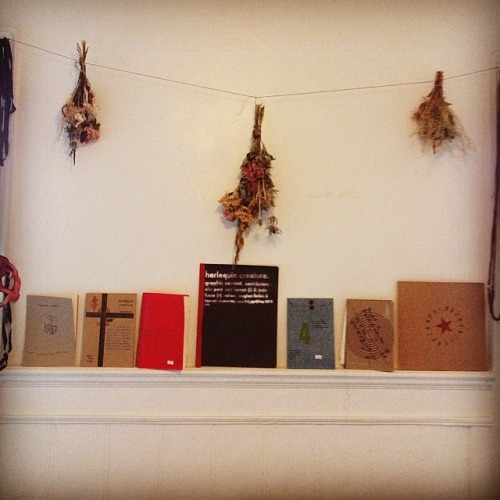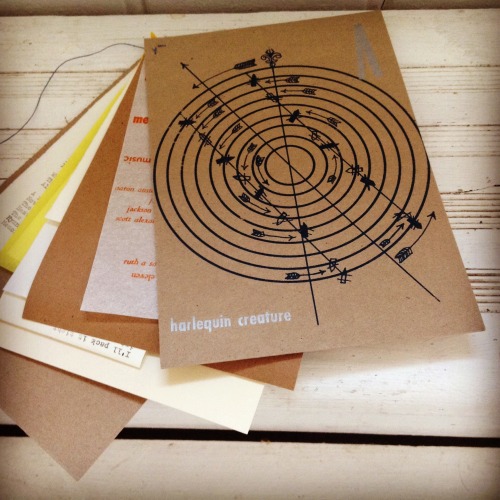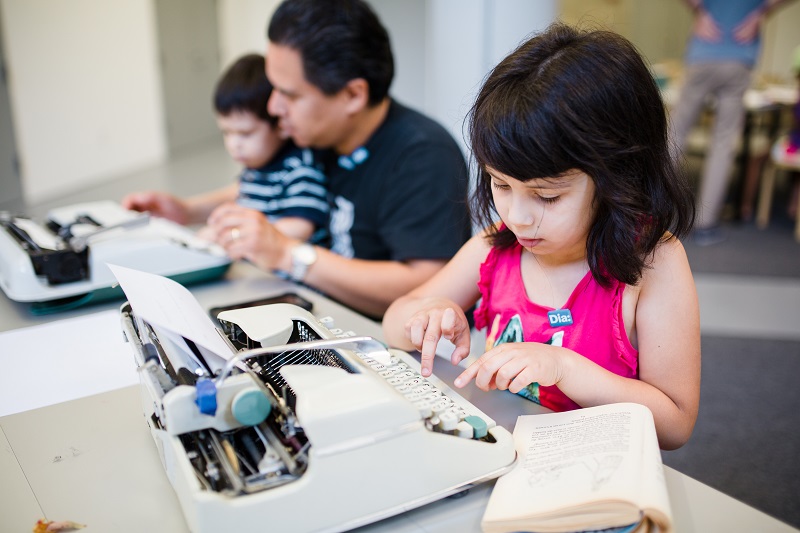Join the Harlequin Creature typing bee in the gallery of Hatcher Graduate Library on Wednesday, February 18th from 11:30am-4:30pm. Sign up for a spot to help produce a one-of-a-kind publication!
Harlequin Creature, a locally-published arts and literature journal, stands out not only for its content, but for its unique production process. Each issue is individually typed by volunteers during typing bees in Ann Arbor, Los Angeles, Brooklyn, and Berlin. Many volunteers return issue after issue, relishing the sense of community and the opportunity to create something tangible.

Past issues of Harlequin Creature. Photo by Meghan Forbes, courtesy of Harlequin Creature.
While the typing bee method was at first intended to be a means of publishing cheaply (not the case, as editor and founder Meghan Forbes discovered after investing in typewriters and supplies), it soon came to be a defining characteristic and even a guiding metaphor for Harlequin Creature. Editor Hannah McMurray suggests that literary work that appears in Harlequin Creature could almost be described as having two creators - the original author and the typist. Slightly varying typefaces on different typewriter models and individual typists’ vagaries result in variant line-breaks, and since the use of white-out is expressly forbidden, methods of correcting typos lend an extra touch of individuality to each copy.

Harlequin Creature Issue #5. Photo by Meghan Forbes, courtesy of Harlequin Creature.
Past issues of Harlequin Creature have focused on themes such as the absurd and nautical life and can be requested for use in the Special Collections Library. The current issue (#6) focuses on children’s literature and includes writing by both children and adults. The theme for this issue grew out of a related project run by Harlequin Creature’s staff - typewriter workshops for children. In an age when schools increasingly drop cursive from the curriculum, you might wonder why one would teach kids how to use a typewriter. However, editor Hannah McMurray explains that typewriters produce direct results on paper in a way that is somehow more physical, more material, and more immediate than a computer, and this physical immediacy provides a new way for struggling readers and writers to focus their attention. Furthermore, the medium really does affect creative output. Just as some writers can only prepare their first drafts in handwritten notebooks, while others can’t imagine anything but typing on their laptop, composing by typewriter opens new doorways for creativity.
So, whether you’re a long-time typewriter aficionado or you’re not even sure how to load the paper, we hope that you’ll join Harlequin Creature for a literary typing bee this Wednesday!

Community Free Day at Dia:Beacon, July 12, 2014. Photo by Nicki Sebastian, courtesy of Harlequin Creature.